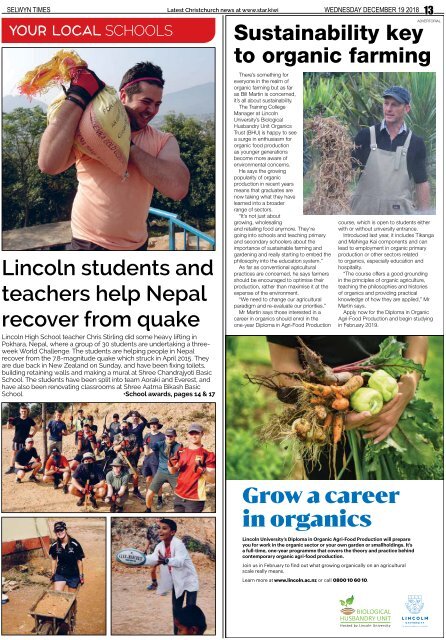You also want an ePaper? Increase the reach of your titles
YUMPU automatically turns print PDFs into web optimized ePapers that Google loves.
SELWYN TIMES Latest Christchurch news at www.star.kiwi<br />
Wednesday <strong>December</strong> 19 20<strong>18</strong> 13<br />
SCHOOLS<br />
ADverTOrIAL<br />
Sustainability key<br />
to organic farming<br />
Lincoln students and<br />
teachers help Nepal<br />
recover from quake<br />
Lincoln High School teacher Chris Stirling did some heavy lifting in<br />
Pokhara, Nepal, where a group of 30 students are undertaking a threeweek<br />
World Challenge. The students are helping people in Nepal<br />
recover from the 7.8-magnitude quake which struck in April 2015. They<br />
are due back in New Zealand on Sunday, and have been fixing toilets,<br />
building retaining walls and making a mural at Shree Chandrajyoti Basic<br />
School. The students have been split into team Aoraki and Everest, and<br />
have also been renovating classrooms at Shree Aatma Bikash Basic<br />
School. •School awards, pages 14 & 17<br />
There’s something for<br />
everyone in the realm of<br />
organic farming but as far<br />
as Bill Martin is concerned,<br />
it’s all about sustainability.<br />
The Training College<br />
Manager at Lincoln<br />
University’s Biological<br />
Husbandry Unit Organics<br />
Trust (BHU) is happy to see<br />
a surge in enthusiasm for<br />
organic food production<br />
as younger generations<br />
become more aware of<br />
environmental concerns.<br />
He says the growing<br />
popularity of organic<br />
production in recent years<br />
means that graduates are<br />
now taking what they have<br />
learned into a broader<br />
range of sectors.<br />
“It’s not just about<br />
growing, wholesaling<br />
and retailing food anymore. They’re<br />
going into schools and teaching primary<br />
and secondary schoolers about the<br />
importance of sustainable farming and<br />
gardening and really starting to embed the<br />
philosophy into the education system.”<br />
As far as conventional agricultural<br />
practices are concerned, he says farmers<br />
should be encouraged to optimise their<br />
production, rather than maximise it at the<br />
expense of the environment.<br />
“We need to change our agricultural<br />
paradigm and re-evaluate our priorities.”<br />
Mr Martin says those interested in a<br />
career in organics should enrol in the<br />
one-year Diploma in Agri-Food Production<br />
course, which is open to students either<br />
with or without university entrance.<br />
Introduced last year, it includes Tikanga<br />
and Mahinga Kai components and can<br />
lead to employment in organic primary<br />
production or other sectors related<br />
to organics, especially education and<br />
hospitality.<br />
“The course offers a good grounding<br />
in the principles of organic agriculture,<br />
teaching the philosophies and histories<br />
of organics and providing practical<br />
knowledge of how they are applied,” Mr<br />
Martin says.<br />
Apply now for the Diploma in Organic<br />
Agri-Food Production and begin studying<br />
in February 2019.<br />
Grow a career<br />
in organics<br />
Lincoln University’s Diploma in Organic Agri-Food Production will prepare<br />
you for work in the organic sector or your own garden or smallholdings. It’s<br />
a full-time, one-year programme that covers the theory and practice behind<br />
contemporary organic agri-food production.<br />
Join us in February to find out what growing organically on an agricultural<br />
scale really means.<br />
Learn more at www.lincoln.ac.nz or call 0800 10 60 10.


















